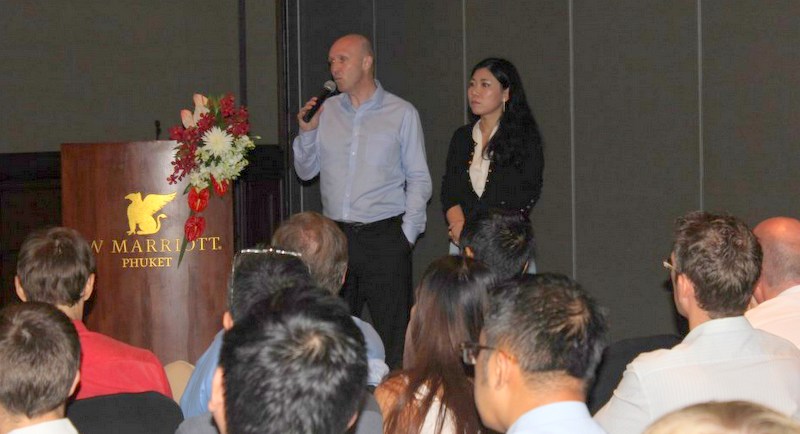Experts place high-end Chinese tourists in Phuket’s sights
Businesses ignoring the burgeoning Chinese tourist market do so at their own peril, warned experts at the American Chamber of Commerce (Amcham) Phuket chapter special seminar at the JW Marriott Phuket Resort & Spa last week.
“Phuket tourism has to adjust to ‘the new normal’ and not wait for things to go back to the way they were before. It’s no longer just the beach that attracts travelers,” said Bill Barnett, CEO of hospitality consulting firm C9Hotelworks, who moderated the event, held last Friday (Sept 18).
“This coming high season is a dynamic year as it will be the first high season with the Russian market greatly diminished, so get the yardstick out to measure the changes,” Mr Barnett challenged.
“While the rouble depreciated larger in the first and second quarters of 2014, many travelers had paid up their high season holidays for 2014/2015, so this year is the first time we go down the rabbit hole and see what the changes mean for hotels and tourism in Phuket.”
Guest speaker David Johnson, Managing Director of Delivering Asia Communications (DAC), rated the Chinese market as critical for Phuket tourism business survival.
“The Chinese market represents the single greatest opportunity the tourism industry in Thailand has perhaps ever seen. For Phuket, as Thailand’s premier tourism destination with its expanding infrastructure and upscale resort and property offerings, I don’t feel anyone can afford to ignore this,” he told The Phuket News this week.
“We have seen over six million Chinese arrive in Thailand in the first six months of this year or 35 per cent of the total number of tourists coming to Thailand. That’s more than double last year when a total of 5.3 million Chinese arrived.
“That is extraordinary growth and there are no signs of it slowing down. Even the mid-August bomb in Bangkok has not dampened the desire to come to Thailand – a top-five destination worldwide for Chinese travellers.”
Mr Johnson, as Managing Director of DAC, is in a position to know. DAC is a leading public relations firm in Asia specialising in the hospitality industry, with 10 operations worldwide and headquartered in Bangkok.
“The challenge is how to attract high end Chinese travellers to Phuket, to resorts and to real estate projects to come and stay, spend and buy. They way to do this is through a digital media strategy that has WeChat at its centre,” Mr Johnson explained.
Vanessa Zhu, DAC’s Shanghai-based digital marketing specialist and Communications Director for China, explained that accessing the high-end Chinese market required a two-pronged strategy.
“One is at the resort itself where Chinese speakers, a high level of personal service, organised and creative itineraries and menus and other collateral all need to be in Chinese,” she explained.
“To access the high-end China market, you need the tools in China to appeal to them. The most important is WeChat, a social media tool that combines all the functions of Facebook, Twitter, LINE, Skype, Instagram, Pinterest and PayPal, which are all banned.
“WeChat has 438 million users, 80% of whom are in China. Resorts need to have an account set up by an official company in China and managed. There is no way round this. It is also very important to invite influential bloggers to visit who have literally millions of followers who will rapidly engage and seek to book based on recommendations.
“We hosted a blogger to Manathai Koh Samui and 24 hours after his post 843,000 people had read it. This is a complete game changer.”
Showing her extensive experience and expertise in the field, Ms Zhu explained simply that Chinese travellers are influenced by other people.
“They follow others, so it is essential to build a presence on the mainland and a group of followers in the right target group,” she explained.
“Or access bloggers who can influence and build followers. But resorts need to have the right channels to influence and book set up. In many cases, this will be the same channel.”
Mr Johnson rated the importance – and the potential cost to a business – of ignoring the Chinese market as “the highest degree”.
“It is a market that will dominate more and more and resorts, hotels and property companies will need clear strategic plans and funds to support them to maximise the potential or get left behind,” he told The Phuket News.
“It will be like putting your head in the sand if businesses ignore this market. At the high end it is very sophisticated and lucrative and offers a tremendous opportunity to businesses in Phuket.”




